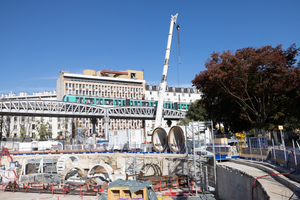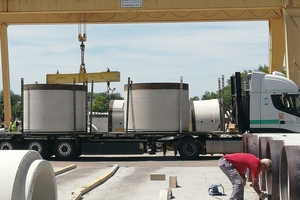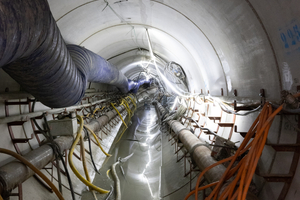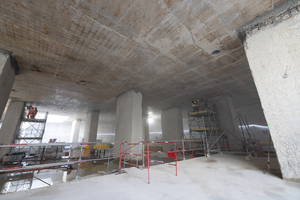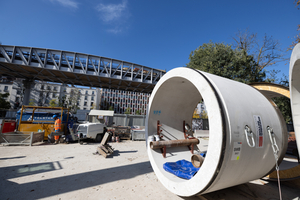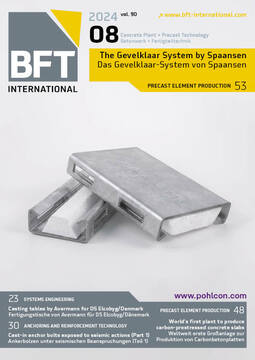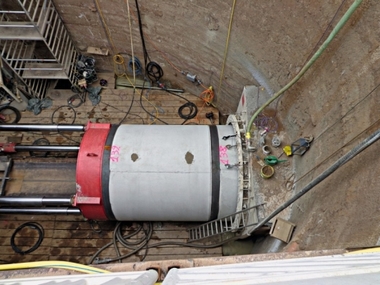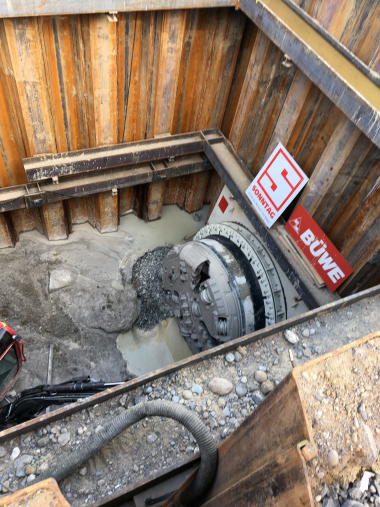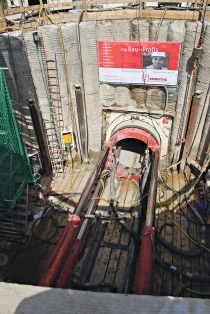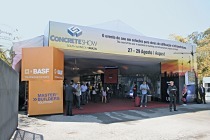Jacking pipes for a construction project in Paris to improve the water quality of the Seine River
This gigantic project was completed in the spring of 2024 in the heart of Paris: the construction of an underground storage basin with a total volume of 50,000 m3, including a sewer 625 m long below the Seine, to improve the water quality of the river. After this famous river had for years been found unsuitable for swimming, it was designated to serve as a setting for swimming competitions during the Olympic Games.
The project was undertaken within the scope of a large-scale construction measure aimed at restoring Seine water quality. Its implementation was forced with a view to the 2024 Olympic Games in Paris. Swimming competitions were held in the Seine once before at the first Olympic Games in 1900. But for more than 100 years afterward, swimming in the river was impossible and forbidden owing to the high level of contamination. The ambitious plan was to improve the water quality in time for the 2024 Olympic Summer Games to such an extent that swimming in the Seine would once again be possible.
Ninety-million-euro project in Paris-Austerlitz
In this way, an imposing overflow basin with a storage capacity of 50,000 m3, the equivalent of 20 Olympic swimming pools, was erected in the 12th and 13th arrondissements within around four years. Connected to the reservoir is a collector 625 m long. Through this canal, with a diameter of 2.50 m, the water flows in or out of the basin. The basin was created by microtunneling boring which, due to its location in the middle of a densely populated million-strong metropolis, presents a special challenge. The rainwater catch basin at a depth of 30 m has a diameter of 50 m. Due to its location near Austerlitz Railroad Station and Austerlitz Bridge, it is referred to as the Bassin d‘Austerlitz or Austerlitz Bassin. As planned, it relieves the Paris canal network, protects from flooding and, accordingly, prevents pollution of the Seine. The client of this 90-million euro project was Service d‘Assainissement de Paris (SAP), which belongs to the municipal administration of Paris. The pipe jacking for this demanding project was carried out by the French company Bessac, which has gained a high level of expertise in tunneling and microtunneling. For the construction measure in Paris, the microtunneling boring machine was required to cover a distance of 625 m, including a section below the Seine. It had to work through various soil conditions down to 27 m below ground and/or the upper edge of the water level.
Just as the safety and stability of tunnel construction was essential, the client was likewise required to meet strict requirements with respect to the safety and quality of the jacking pipes.
CO2 reduction by up to 20 % by use of CEM III cement
The German company Berding Beton, which has been manufacturing concrete construction products in some 60 plants for over 60 years, was commissioned with delivery of the jacking pipes. The product line comprises more than 16,000 products in groups including hydraulic structures, paving blocks, pipes/manholes, ready-mixed concrete and rainwater management systems. In this case as well, the jacking pipes were manufactured individually to the specified technical regulations as well as to customer-specific wishes regarding dimensions and quality.
These requirements included sewer pipes with a maximum resistance to acid: because, in service, they are often exposed to chemical influence in the polluted wastewater. To be resistant to all chemical attack, concrete with greater acid resistance of XA3 quality had been specified. For manufacture in the Philippsburg-Rheinsheim plant, cement CEM III/A of special strength was used. Furthermore, the cement CEM III/A receives high marks for achieving a CO2 reduction of up to 20 %, compared to conventionally used CEM I cements.
Over a period of five months, 315 reinforced jacking pipes with an interior diameter of ID 2,500 mm, an outer diameter of OD 3,000 mm and an individual pipe length of L = 2,000 mm were manufactured. All the jacking pipes were hardened in their forms, which alone offers several advantages: low pore volume, a very smooth surface and slight production tolerances. These properties are highly beneficial, especially for longer jackings with curved radii, as was the case with the construction project in Paris. To be able to guarantee on-time delivery, two production forms were simultaneously used in the Berding Beton plant. At the time of delivery, it was necessary that all jacking pipes had a minimum age of 28 days and a concrete strength class of C 50/60.
For transport, know-how was demanded as well: because the jacking pipes were transported upright “Eye to the Sky” in open trucks, to enable turning at the construction site.
Olympic swimming competitions possible in the Seine
Due to their size and/or the individual weight of eleven tons per pipe, each truck could accommodate only two pipes. Since Berding Beton was required to ensure delivery of up to 50 pipes per week, the job was a genuine challenge both in terms of production engineering and logistics.
Routing of the pipeline required special attention as well: the microtunneling bore machine had to master, on its route, various curved sections with partly very tight radii. When tunneling the various radii of R = 450 m, R = 200 m and an opposing radius of R = 250 m, it had been of special importance to specify and dimension the means for pressure transfer. Taking the local conditions into consideration, hybrid pipe jacking was decided on. Accordingly, wood, OSB boards of 2 x 18 mm thickness and a hydraulic joint hose were used.
Due to the expected high hydraulic loading on the jacking pipes in depths up to 27 m, it had been important to ensure absolute tightness both against the inner and outer pressure from the ground and/or Seine water. For this reason, all reinforced-concrete jacking pipes were provided with the DS sealing system, which is designed to be resistant to a maximum outer pressure of 2.7 bar. The GRS wedge-shaped sliding seals were glued on in a concrete chamber.
After all important aspects were taken into account, the project was successfully concluded. The giant rainwater storage basin with connected sewer will now protect Paris from flooding and from pollution of the Seine, and will assure meeting the required conditions for the Olympic Games in the river. Roland Kolb, Sales Manager of the Berding Beton plant in Rheinsheim – and as such responsible for production to specifications and on-time delivery of all jacking pipes – draws a positive conclusion: “It was a very demanding project in a difficult environment, one with special challenges. A successful construction project stands or falls, as always, with the competence, the quality and the successful communication among all participants. This was definitely the case for this project. Collaboration between Bessac and Berding Beton, in particular, functioned very well in an exemplary manner.”
CONTACT
Berding Beton GmbH
Industriestr. 6
49439 Steinfeld/Germany
+49 5492 87-24

